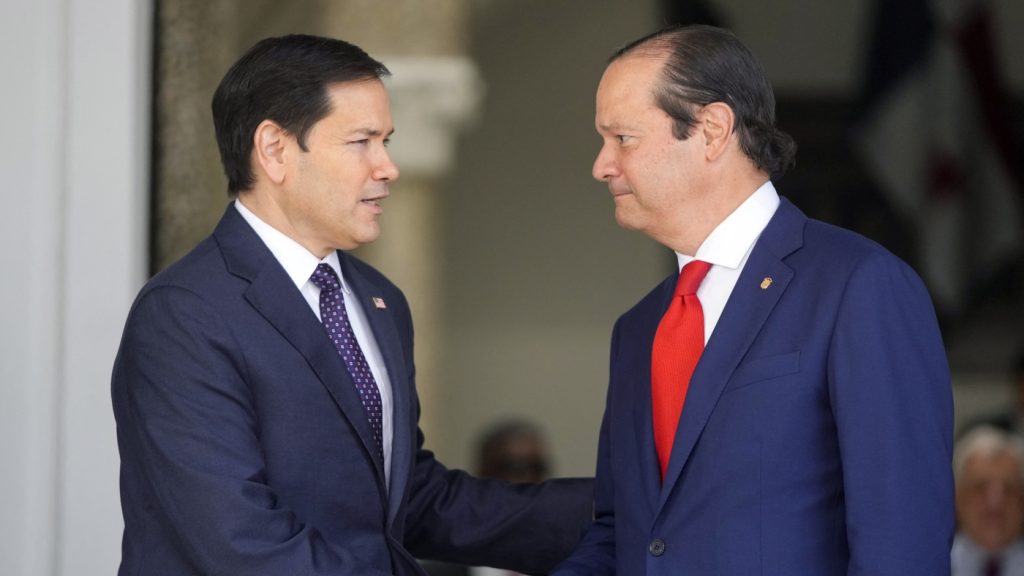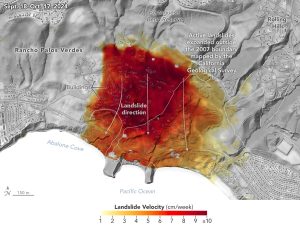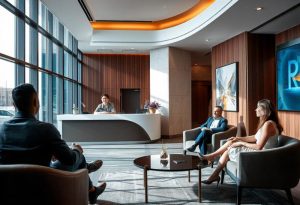
Panama’s Foreign Minister Javier Martinez-Acha (R) shakes hands with U.S. Secretary of State Marco Rubio while leaving a meeting at the presidential palace in Panama City, Panama, on Sunday.
Mark Schiefelbein/Pool/AFP via Getty Images
hide caption
toggle caption
Mark Schiefelbein/Pool/AFP via Getty Images
U.S. Secretary of State Marco Rubio told the leaders of Panama on Sunday that the Central American country must take immediate action on curbing China’s influence over the Panama Canal area or the United States will get involved.
Rubio is on his first overseas trip as America’s top diplomat. In addition to Panama, he is scheduled to visit El Salvador, Costa Rica, Guatemala and the Dominican Republic this week.
On Sunday, Rubio spoke with Panamanian President José Raúl Mulino and Foreign Minister Javier Martínez-Acha. He told them that President Trump “has made a preliminary determination that the current position of influence and control of the Chinese Communist Party over the Panama Canal area is a threat to the canal,” according to a State Department summary of their discussion, adding that China’s presence in the canal area breaches a treaty signed by the U.S. and Panama in 1977 ensuring the canal would be neutral and open to all nations.
“Secretary Rubio made clear that this status quo is unacceptable and that absent immediate changes, it would require the United States to take measures necessary to protect its rights under the Treaty,” State Department spokesperson Tammy Bruce said in a statement.
Speaking to reporters, Mulino said his talks with Rubio were “respectful” and “positive” and said he did not “feel like there’s a real threat against the treaty and its validity,” The Associated Press reported.
The Panama Canal, which connects the Atlantic and Pacific Oceans, is vital to global trade. The United States is the waterway’s biggest user, but other major users include Chile, China, Japan, and South Korea, according to the Council on Foreign Relations.
A Hong Kong-based company has managed ports on the Atlantic and Pacific coasts since 1997, but there “is no evidence” the Chinese government controls the canal, the CFR said. However, Chinese companies have been heavily involved in infrastructure projects around the canal in recent years, according to the Center for Strategic and International Studies.
Rubio has said that in the event of a conflict, Chinese companies could potentially turn the canal into a choke point.
Trump has increasingly spoken about wanting to retake the canal, claiming that Panama has given control of the waterway to China. During his inauguration speech last month, the president said: “We didn’t give it to China. We gave it to Panama, and we’re taking it back.”
The U.S. controlled the canal between 1903 and 1977, but President Jimmy Carter signed treaties to gradually give control of the narrow Canal Zone to Panama. Full ownership was given to Panama in 1999.
It remains unclear what kind of consequences Panama may face if it does not follow suit on Rubio’s request. Leland Lazarus, who studies China’s role in Latin America at Florida International University, told NPR that Rubio will have his work cut out, because China is a major trading partner across Latin America.
Prior to Rubio’s trip, Panama’s president had already ruled out any discussions over control of the Panama Canal, saying that their conversation should focus on trade and migration.
NPR’s Michele Kelemen contributed reporting.









